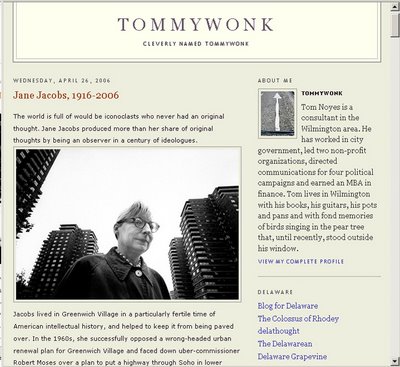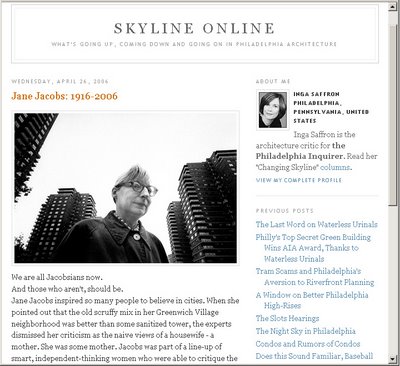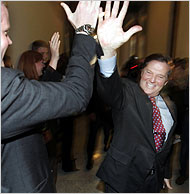Neil Young's Living With War
 You should do the same.
You should do the same.Hear it for free.
www.tommywonk.com
 You should do the same.
You should do the same.Since he took the top job at Pfizer in 2001, Mr. McKinnell has received $65 million in compensation and will receive an $83 million pension when he retires. During his tenure, Pfizer's shares have lost 46 percent of their value.In most settings, 20 percent opposition isn't much, but in elections to corporate boards, it's a big number, since it comes from mostly institutional investors.
Rajesh Kumar, an orthopedic surgeon from Lincoln who said he was a Pfizer shareholder, asked from the floor why Mr. McKinnell received in two days what he as a doctor earned over the course of one year.
 WVUD 91.3 is the only radio station in the area that doesn't restrict its DJs to a playlist. Weekday mornings are devoted to the Roots block with a terrific lineup of volunteers behind the mic. My personal favorites are Mark Taylor (pictured) on Thursdays and Scott Birney on Fridays.
WVUD 91.3 is the only radio station in the area that doesn't restrict its DJs to a playlist. Weekday mornings are devoted to the Roots block with a terrific lineup of volunteers behind the mic. My personal favorites are Mark Taylor (pictured) on Thursdays and Scott Birney on Fridays. Inga Saffron evidently uses the same blog template that I adapted for tommywonk. She also used the same photo for her heartfelt post on Jacobs:
Inga Saffron evidently uses the same blog template that I adapted for tommywonk. She also used the same photo for her heartfelt post on Jacobs: Eerie convergence or evidence of shared good taste? You decide.
Eerie convergence or evidence of shared good taste? You decide. Jacobs lived in Greenwich Village in a particularly fertile time of American intellectual history, and helped to keep it from being paved over. In the 1960s, she successfully opposed a wrong-headed urban renewal plan for Greenwich Village and faced down uber-commissioner Robert Moses over a plan to put a highway through Soho in lower Manhattan. If Jacobs and her allies hadn’t opposed the powers that be, two of Manhattan’s most distinct neighborhoods would be very different today.
Jacobs lived in Greenwich Village in a particularly fertile time of American intellectual history, and helped to keep it from being paved over. In the 1960s, she successfully opposed a wrong-headed urban renewal plan for Greenwich Village and faced down uber-commissioner Robert Moses over a plan to put a highway through Soho in lower Manhattan. If Jacobs and her allies hadn’t opposed the powers that be, two of Manhattan’s most distinct neighborhoods would be very different today. The philosopher Alfred North Whitehead wrote that Western philosophy is nothing more than “a series of footnotes to Plato.” It could be said that urban planning in our lifetime is nothing more than footnotes to Jane Jacobs. An exaggeration? Perhaps. But a book or article on urban planning that doesn’t take note of Jacob’s insights is inconceivable.
The philosopher Alfred North Whitehead wrote that Western philosophy is nothing more than “a series of footnotes to Plato.” It could be said that urban planning in our lifetime is nothing more than footnotes to Jane Jacobs. An exaggeration? Perhaps. But a book or article on urban planning that doesn’t take note of Jacob’s insights is inconceivable.This book is an attack on current city planning and rebuilding.The revolutionary impact of Death and Life comes from keen observation:
Think of a city and what comes to mind? Its streets. If a city’s streets look interesting, the city looks interesting; if they look dull, the city looks dull.Jane Jacobs started in motion the return to the architecture of community and a turning away from what became known as brutalism. HUD has been replacing unsuccessful high-rise housing projects with community friendly mixed developments. New urbanists are building urban and suburban communities that incorporate the virtues that Jane Jacobs extolled.
Classified telephone directories tell us the greatest single fact about cities: the immense numbers of parts that make up a city, and the immense diversity of those parts.For instance, Wilmington’s phone book features four listings under “Glassblowing” (at least one of which specializes in laboratory glassware) and two listings under “Automaton Consultants.” The phone books for larger cities will feature specialists not found in medium sized cities like Wilmington. Jacobs described how this came to be in The Economy of Cities. In Cities and the Wealth of Nations, she challenges the assumptions underlying the the many spectacular failures of economic development in the 20th century:
However, in the face of so many nasty surprises, arising in so many different circumstances and under so many differing regimes, we must be suspicious that some basic assumption or other is in error, most likely an assumption so much taken for granted that it escapes identification and skepticism.Instead of nations, Jacobs proposed that city regions are the fundamental units for meaningful macroeconomic analysis, an observation that hardly seems remarkable today.
Macro-economic theory does contain such an assumption. It is the idea that national economies are useful and salient entities for understanding how how economic life works and what its structure may be: that national economies and not some other entity provide the fundamental data for macro-economic analysis.
We are all Jacobsians now.
And those who aren't, should be.
"If you had a health problem, you'd want somebody to give you a second opinion," said Representative Frank R. Wolf, an influential Virginia Republican who helped recruit Mr. Baker for the job. "What the United States needs on Iraq is some fresh ideas from people able to speak out, and no one is more qualified to do that than Jim Baker."One can only wish that Bush had shown a greater interest in the facts before sending us to war in Iraq.
What gives Mr. Baker's role weight, however, is that while he has never publicly deplored the decision to go to war, he wrote in his memoirs that he had opposed ousting Saddam Hussein in the Persian Gulf war in 1991 out of concern that it would have led to an Iraqi civil war, international resentment of the United States and eventual loss of American support for an occupation. He has told colleagues that he feels vindicated.Baker is co-chairman, along with former congressman Lee Hamilton, of a congressionally funded effort called the Iraq Study Group that seems genuinely bipartisan:
Among their team are William J. Perry, a former defense secretary under President Clinton; former Mayor Rudolph W. Giuliani of New York; the former Supreme Court justice Sandra Day O'Connor; and Vernon E. Jordan Jr., a longtime civil rights leader, Washington power broker and confidant of President Clinton.
Saturday is Earth Day, and many of you are asking how we can meet our growing energy needs while protecting our environment. The key is technology. So I have proposed the Advanced Energy Initiative to change the way we power our homes, businesses, and cars.As Business Week points out, President Sluggo hasn't matched his rhetoric with his actions:
Across the board, federal funding for energy efficiency is taking a major hit. In the White House's proposed 2007 budget, efficiency spending is down 17% overall from 2006 appropriations, and 25% from levels in 2002. The cuts are deeper for individual programs. Research to help industry reduce energy use is slated for a 30% decrease, and some programs are being shut down.
On Monday, [House Speaker Dennis] Hastert and Bill Frist, Senate majority leader, will send letters urging the Justice Department and the Federal Trade Commission to immediately investigate alleged price gouging and market speculation.Of course, the problem is not that of price gouging. And Republicans can hardly argue, as did White House press secretary Scott McClelland, that “It’s not something that occurred overnight, and it’s not something that’s going to be solved overnight.”
The issue of high oil prices is a difficult one for Republicans and President George W. Bush, who traditionally enjoy close relations with the energy industry. And, while it is unclear what steps the government can take to lower prices, politicians face mounting pressure to show their willingness to act.
Crude oil prices hit a new record high of more than $75 a barrel yesterday, and petrol prices are above $3 per gallon in many parts of the country. That, in addition to the disclosure of a $400m retirement package for Lee Raymond, former chief executive of Exxon Mobil, has fed public rage at the oil industry.
Under Carper's proposal, U.S. power plants would be required to reduce mercury emissions by 90 percent by 2015 and cap carbon dioxide levels at 2006 levels by the end of the decade. They would then be required to roll back these emissions to 2001 levels by 2015.Carper visited a coal-fired power plant owned by a company that has plans to reduce mercury emissions:
In addition, the bill would require a more than 80 percent reduction in sulfur dioxide emissions and a 70 percent reduction in nitrogen oxide emissions by 2015.
Meanwhile, the NRG Energy Co., which owns and operates the Indian River Power Plant near Millsboro, is talking about significant upgrades to the plant aimed at reducing pollution levels there.Those who think only of the costs of environmental protection, might be confused by these comments by Ray Long of NRG:
Carper made his announcement with the Indian River plant as his backdrop.
Long said with new state pollution standards in the works, traditional pollution upgrades could cost hundreds of millions of dollars. Building a coal gasification plant would cost $1 billion, he said.You mean you can make money improving the environment? Maybe someone could explain this to our MBA president.
"Therein lies the opportunity," he said.
With the expected passage this spring of the largest emergency spending bill in history, annual war expenditures in Iraq will have nearly doubled since the U.S. invasion, as the military confronts the rapidly escalating cost of repairing, rebuilding and replacing equipment chewed up by three years of combat.Compare and contrast with Rumsfeld's estimate in an interview with George Stephanopoulos on January 19, 2003, via the DoD:
The cost of the war in U.S. fatalities has declined this year, but the cost in treasure continues to rise, from $48 billion in 2003 to $59 billion in 2004 to $81 billion in 2005 to an anticipated $94 billion in 2006, according to the Center for Strategic and Budgetary Assessments. The U.S. government is now spending nearly $10 billion a month in Iraq and Afghanistan, up from $8.2 billion a year ago, a new Congressional Research Service report found.
Rumsfeld: The Office of Management and Budget estimated it would be something under 50 billion dollars.Did he lie or is he simply incompetent? Either way, does he deserve to keep his job?
Stephanopoulos: Outside estimates say up to 300 billion.
Rumsfeld: Baloney.
For instance, you probably didn’t know that the first person to die during the invasion of Iraq illegally came to America from Guatemala. His name was Jose Gutierrez.No I didn't know. The House version of immigration reform is particularly harsh:
--People could be denied entry based on their political views.Immigrant families do not come to the U.S. to undermine our values; they come to the U.S. because they embrace our values and are willing to work extremely hard to make a better life for themselves. The punitive House immigration bill is creating problems for Republicans, who have tried to court Latino voters and now risk alienating a growing population. Yes immigrants don't vote, but they are part of large communities of people who do vote. Arguments about immigrants not sharing "our culture" fail to appreciate the ways in which immigrants have wholeheartedly embrace American ideals.
--If an immigration agent suspected anyone within 100 miles of a land border of being in the country illegally, they would have the power to have the person immediately deported without a trial.
--In court hearings, "Secret evidence" could be used against immigrants, who would not have access to the evidence.
--All children born to illegal immigrants in the United States would become wards of the state.
--Housing of illegals would be considered a felony and subject to no less than 3 years in prison.
The memorandum begins by stating, "U.S. senior military leaders are involved to an unprecedented degree in every decision-making process in the Department of Defense." It says Mr. Rumsfeld has had 139 meetings with the Joint Chiefs of Staff since the start of 2005 and 208 meetings with the senior field commanders.How a precise accouting of the number of meetings he has held with top brass refutes the charge of micromanagment escapes me. The point of course, is not how often Rumsfeld meets with the top commanders, but that the war in Iraq isn't working despite his seemingly boundless capacity for self assurance in the face of contrary evidence.
"Exxon was there long before Mr. Raymond was there and will be there long after he leaves. Yet he received Rockefeller returns without taking the Rockefeller risk."One remarkable feature of his supersized compensation (the NYT calculated it to be $144,573 a day during his 12 year tenure) is that much of it remained undisclosed. He received $400 million in his last year with the company, including an imprssive $98 million pension. His 2005 compensation came to 6 cents per share.
"We are innocent. And by 'we' I mean Enron Corp.," Skilling said shortly before his lawyer, Daniel Petrocelli, finished his direct examination and court adjourned. "It was a fine company. I am innocent of all of these charges, and I will fight for that for a long time."Perhaps, but tricked by whom?
He called for others to take a stand, as well.
"Unless someone takes a stand, and I think Ken (Lay) and I are taking a stand, they are going to feel that they were tricked.
"I'm sorry. I have to calm down here a little bit," Skilling said, pulling back.This may be an astute bit of innoculation on Petrocelli's part. I imagine that prosecutors will be working hard to get under his skin when they begin their cross examination on Monday.
"Is it difficult at times to contain how upset you are?" Petrocelli asked, guiding his client to a subject that usually elicits great anger and emotion from Skilling.
"Yes, at times, yes," Skilling replied.
"Did you ever have a single conversation with someone at Enron in which you said, 'We're not cutting it, we've got to break the law. Do it!' ?" Petrocelli asked.Skilling is that he has kept his temper in check under the gentle questioning of his lawyer. I'm guessing that prosecutors are looking to get under Skilling's thin skin when they get a crack at him. I'm waiting for Skilling to tell the government they just don't get it.
"No," Skilling replied. "I don't think I did anything remotely like that."
Mr. Skilling said Monday that short sellers and The Wall Street Journal had an organized campaign to damage the company. He said that after he left Enron he was "thrilled with the operating performance" of the company. But in October, The Wall Street Journal began writing articles questioning Mr. Fastow's LJM partnerships.One wonders how credible the jury will find this upbeat assessment of Enron's financial condition after weeks of testimony describing the company's problems.
Bluntly and repeatedly, Fitzgerald placed Cheney at the center of that campaign. Citing grand jury testimony from the vice president's former chief of staff, I. Lewis "Scooter" Libby, Fitzgerald fingered Cheney as the first to voice a line of attack that at least three White House officials would soon deploy against former ambassador Joseph C. Wilson IV.The New York Times reports that the intelligence that President Bush authorized Scooter Libby to leak was precisely that which was being disputed inside the intelligence apparatus:
A review of the records and interviews conducted during and after the crucial period in June and July of 2003 also show that what the aide, I. Lewis Libby Jr., said he was authorized to portray as a "key judgment" by intelligence officers had in fact been given much less prominence in the most important assessment of Iraq's weapons capability.
Mr. Libby said he drew on that report, the October 2002 National Intelligence Estimate on Iraq, when he spoke with the reporter. However, the conclusions about Mr. Hussein's search for uranium appear to have been buried deeper in the report in part because of doubts about their reliability.
The concerted effort was designed to impune the credibility of those who questioned the relentless march to war. Now it's the credibility of those leading us to war that is at an all time low.
Mr Rubin was sharply critical of the Bush administration’s handling of the economy. “It is on the wrong track on almost every front...We need to address fiscal imbalances, entitlements, low personal savings rates, high debt and the current account deficit. No other developed country in the world has this combination of imbalances.”One might think that Democratic Party activists would welcome such a contribution from a national figure with the credibility of Robert Rubin, particularly given the project's conviction that "broad-based economic growth participation is stronger and more sustainable."
Wall Street Dems Unveil Plan to Undermine ProgressivesNow reasonable people can disagree about issues such as the country's trade policy, but to cast such a disagreement as a war on progressives seems less than useful. Why go back and fight Clintonism when we've been out of power for five years? Meanwhile, those who are in power have frittered away the federal budget surplus and undermined the policies that created eight years of economic growth that in fact did benefit a broad range of Americans.
 That's what's been bugging me since yesterday, when DeLay looked more like a man taking a victory lap than one resigning in disgrace. Maybe that's because, in his mind, he has won -- by reshaping Washington to fit his brutally partisan style. In Tom DeLay's world, his indictment on ethics charges is just another skirmish in his political career. For him, there is no right or wrong, just winning and losing.
That's what's been bugging me since yesterday, when DeLay looked more like a man taking a victory lap than one resigning in disgrace. Maybe that's because, in his mind, he has won -- by reshaping Washington to fit his brutally partisan style. In Tom DeLay's world, his indictment on ethics charges is just another skirmish in his political career. For him, there is no right or wrong, just winning and losing.John Boehner, his replacement as Republican leader, called Mr DeLay "one of the most effective and gifted leaders the Republican party has ever known", adding that hehas "served our nation with integrity and honour". The two have similarly close ties to the K Street corridor where many of Washington's top lobbyists reside. A congressional watchdog group last month coined the phrase "a Boehner tan", saying the new leader has taken dozens of trips to sunny golfing destinations, paid for by funds raised from lobbyists.